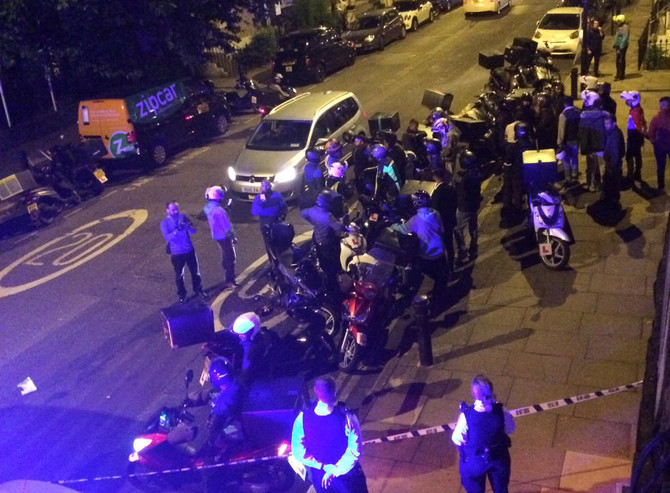LONDON: The British government faced mounting pressure on Friday to introduce controls on the sale of acid after a string of horrific attacks in London.
Five acid attacks took place within 90 minutes on Thursday night, sparking angry calls by politicians and the public for tougher sentencing.
British MP Stephen Timms has called for the carrying of acid to be a crime, while almost 400,000 people have signed a petition calling for Parliament to “prohibit the purchase of acid to those without a license.”
But some legal experts warned against knee-jerk legislation that fails to deal with the causes of crime.
Felicity Gerry QC, an international criminal lawyer, said such laws always create more work for the police.
“It is time to consider whether or not people have a reasonable excuse to carry acid, but it would be very hard to identify which acids and what products, and I think there’s potential for it creating more problems than it solves,” she said.
“I think for the moment (we) need to support the police and find out who’s doing these attacks and why.”
The attacks in London on Thursday began when two men on a moped threw a noxious substance into the face of a 32-year-old moped driver, then stole his vehicle.
A further four attacks took place across a large swathe of east London, with at least one victim, a man in his 20s, left with life-changing injuries, police said.
Two teenagers aged 15 and 16 have been arrested in connection with the attacks, on suspicion of robbery and causing grievous bodily harm, according to London’s Metropolitan Police.
The use of corrosive substances is due to be discussed in Parliament on July 17. The rise in acid attacks has surged from 162 in 2012 to 452 last year, according to police figures.
Downing Street told the BBC on Thursday that the government is “working with the police to see what more we could do.” But legal experts are skeptical about the effectiveness of hastily conceived legislation.
“If there are zones where there are a high number of attacks on delivery drivers, then it’s not the acid you need to deal with, it’s the attacking,” said Gerry.
“The work that it involves to bring in a new law, you could divert those resources to stopping the crime in the first place. Finding out why delivery drivers are being attacked is more useful than creating a law to deal with one part of that, which involves the use of acid.”
The QC’s comments were backed by legal expert James Saunders, a criminal defense, trials and appeals lawyer.
“Parliament is free to pass a new law, but is it needed? Using acid to attack someone… is grievous bodily harm with intent, and carries life imprisonment,” said Saunders.
“I can see merit in requiring a license to buy strong acids, but where do you stop? Strong alkalis are just as dangerous.”
Thursday’s assaults follow a spate of high-profile attacks, including one in which a man is accused of throwing acid at an aspiring model and her cousin as they sat in their car in Beckton, east London, on June 21. John Tomlin will face two counts of causing grievous bodily harm.
Police are calling for more information into Thursday’s attacks, with London’s police chief, Cressida Dick, telling LBC Radio that officers are concerned by the increase in the “completely barbaric” attacks.
She added: “We will arrest people, we will enforce the law as we can, and we are working very closely with the (government) to try to see if there (are) any changes in the law required.”
— With input from AP
























